|
|
|
Sort Order |
|
|
|
Items / Page
|
|
|
|
|
|
|
| Srl | Item |
| 1 |
ID:
117542
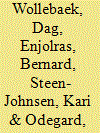

|
|
|
|
|
| Publication |
2012.
|
| Summary/Abstract |
The article examines short-term effects of terror on trust and civic engagement in Norway. Prior to the July 22, 2011 attacks, Norway ranked among the nations with the highest levels of trust and civic engagement in the world. How does a nation of trusters react to terror? Based on two web surveys conducted in March/April 2011 and August 2011 short-term effects on trust, fear, and political interest and participation are analyzed. Two competing hypotheses are explored: first, the "end-of-innocence hypothesis," which assumes that the attacks have disrupted trust and instilled a new culture of fear, and second, the "remobilization hypothesis," which assumes that the attacks have led to a reinforcement of trust and of civic values. Our results show increased interpersonal and institutional trust as well as a modest increase in civic engagement, especially among youth. Moreover, there is little increase in experienced fear within the population. Our study therefore supports the remobilization-of-trust hypothesis. Contrary to the intended aims of the attacker, the structures of trust and civic engagement seem to have been reinforced in Norwegian society. This study in part corroborates findings concerning short-term effects after September 11, 2001.
|
|
|
|
|
|
|
|
|
|
|
|
|
|
|
|
| 2 |
ID:
096394
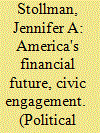

|
|
|
|
|
| Publication |
2010.
|
| Summary/Abstract |
Institutions of higher learning reflect the philosophies, environments, and resources of their location. Fort Lewis College sits in the San Juan Mountains, a part of the Rocky Mountain chain in southwest Colorado. Throughout its history, the College has successfully transformed itself to suit the needs of its students. Flexibility is demonstrated in frequent changes in focus, curriculum, student population, and programming. Founded as an agricultural high school in 1911, the College transitioned to a two-year college in 1927, implemented an agricultural and mechanic two-year degree program in 1933, assumed junior college status in 1948, and finally, in 1962, became a baccalaureate degree-granting institution that centered its educational objectives around a liberal arts philosophy. Additionally, the College's diverse faculty and student population impact the curriculum and programs. Students of differing classes, ethnicities, regions, and faith traditions share intellectual and physical space. Presently, the student population is just under four thousand, and there are approximately two hundred tenure or tenure-track faculty. Eighteen percent of the student population is native, representing over 125 different nations, but principally the Navajo nation. These statistics require the College to adjust its curricular objectives to suit the intellectual levels and goals of its students.
|
|
|
|
|
|
|
|
|
|
|
|
|
|
|
|
| 3 |
ID:
096393
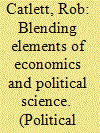

|
|
|
|
|
| Publication |
2010.
|
| Summary/Abstract |
I don't think I am good enough" was more than one student's response when invited to participate in civic engagement activities or to articulate their own original scholarly ideas. The insecurities underlying comments like this one are probably much more complex when put into the context of a student's academic life and its normal expectations. Students may have heard about previous civic engagement ventures from classmates who preceded them, and admittedly, many of those students had similar reservations in previous American Democracy Project (ADP) ventures; however, the America's Future Initiative was different. This initiative aspires to engage students' critical and analytical thinking on issues related to deficits and debt, especially in the public sector; furthermore, America's Future is a call to action without a prepared script.
|
|
|
|
|
|
|
|
|
|
|
|
|
|
|
|
| 4 |
ID:
126425
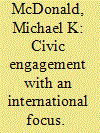

|
|
|
|
|
| Publication |
2013.
|
| Summary/Abstract |
Recent trends in political science include civic engagement and experiential education pedagogy, but this has been notably absent from courses on international relations and comparative politics. This article discusses how I designed an international civic engagement experience for students-without leaving campus. I echo other scholars' claim that civic engagement pedagogy can and should be used in courses with an international focus, and I provide one example of how to go about that task.
|
|
|
|
|
|
|
|
|
|
|
|
|
|
|
|
| 5 |
ID:
186655
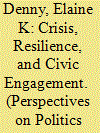

|
|
|
|
|
| Summary/Abstract |
How do economic shocks and financial resilience shape civic engagement, especially for the economically insecure? I turn to the early months of the coronavirus pandemic for insights. In April 2020, with more than 23 million adults unemployed, the US government asked residents to participate in the constitutionally mandated decennial census. I test how variations in income shocks from the shutdown and sources of financial resilience predict disparities in census completion, a civic act designed to minimize participation barriers. First, I use nationally representative survey data to demonstrate that policies that protect the economically vulnerable from the full impacts of economic shocks also predict higher census completion rates. Then, I use Google Trends data to show that high unemployment search volume interacted with low resilience to predict depressed census completion. Findings shed light on how economic crises can widen participation gaps—with representation and resource consequences—and how policies that lessen acute economic shocks may reduce participation disparities.
|
|
|
|
|
|
|
|
|
|
|
|
|
|
|
|
| 6 |
ID:
092870
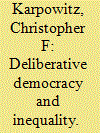

|
|
|
|
|
| Publication |
2009.
|
| Summary/Abstract |
Deliberative democracy grounds its legitimacy largely in the ability of speakers to participate on equal terms. Yet theorists and practitioners have struggled with how to establish deliberative equality in the face of stark differences of power in liberal democracies. Designers of innovative civic forums for deliberation often aim to neutralize inequities among participants through proportional inclusion of disempowered speakers and discourses. In contrast, others argue that democratic equality is best achieved when disempowered groups deliberate in their own enclaves (interest groups, parties, and movements) before entering the broader public sphere. Borrowing from each perspective, the authors argue that there are strong reasons to incorporate enclave deliberation among the disempowered within civic forums. They support this claim by presenting case study evidence showing that participants in such forums can gain some of the same benefits of deliberation found in more heterogeneous groups (e.g., political knowledge, efficacy and trust), can consider a diversity of viewpoints rather than falling into groupthink and polarization, and can persuade external stakeholders of the legitimacy of the group's deliberations.
|
|
|
|
|
|
|
|
|
|
|
|
|
|
|
|
| 7 |
ID:
117554
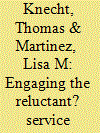

|
|
|
| 8 |
ID:
187296
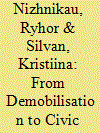

|
|
|
|
|
| Summary/Abstract |
What tools do authoritarian regimes possess for responding to new political and socio-economic threats? This essay presents a case study of the 2014–2019 reorganisation of the Belarusian Republican Youth Union (Bielaruski respublikanski sayuz moladzi—BRYU), a government-controlled administrative mass organisation. It shows that, in the spirit of the regime's paradigm shift in domestic policy towards ‘soft Belarusianisation’ and participatory authoritarianism, the BRYU became a mobilisation tool, instrumentalised for popularising a Belarusian cultural revival and endorsing local civic activism. Paradoxically, these new functions unharnessed young people's agency within the BRYU in a way that would backfire, for instance, during the Belarusian crisis of 2020.
|
|
|
|
|
|
|
|
|
|
|
|
|
|
|
|
| 9 |
ID:
101437
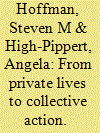

|
|
|
|
|
| Publication |
2010.
|
| Summary/Abstract |
Community energy initiatives offer a potentially important means for reshaping the electrical system in a manner compatible with emissions reduction goals. Many such initiatives, however, focus upon top-down, institutionally structured approaches that understand community residents as atomistic, economically motivated, and minimally engaged. This paper examines a number of case studies that are based upon a bottom-up approach rooted in a civic culture that seeks to maximize the capacities of an active and engaged citizenry. The paper focuses upon two mutually dependent issues: first, recruiting community members, and second, sustaining their participation.
|
|
|
|
|
|
|
|
|
|
|
|
|
|
|
|
| 10 |
ID:
154159
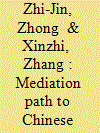

|
|
|
|
|
| Summary/Abstract |
This study refreshes the communication mediation model by integrating impacts of individual psychological traits (civic motivations and political efficacy) with the relationships between Chinese netizens' media news uses, civic expression/discussion and civic engagement in the model. The results of an online survey (N=490) indicated that new media and conventional media have indirect effects on civic engagement through different mediators. Specifically, reading news from the newspapers has a negative impact on motivations driven by emotion, but directly spurs political efficacy, civic discussion and engagement. By contrast, watching TV news encourages civic discussion, while browsing news online increases the likelihood of participatory behaviours, driven by emotions of anger or sadness. Pressure from social networks is positively related to civic engagement. Motivations of civic duties, emotion and political efficacy are positively related to online civic expression and discussion with social networks about public affairs, both of which are strongly associated with participatory behaviours.
|
|
|
|
|
|
|
|
|
|
|
|
|
|
|
|
| 11 |
ID:
149191
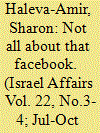

|
|
|
|
|
| Summary/Abstract |
Only 26 months separate the elections for the 19th Knesset (January 2013) from those for the 20th (March 2015), yet the digital campaigns employed in the latter demonstrate interesting shifts. Using empirical data collected from social network sites and from journalistic campaign coverage, this article analyses the use of the online sphere by parties, candidates and audiences, identifying evolving shifts in digital campaigning. The findings point out the reoccurrence of some trends, whether intensified or otherwise, as well as the emergence of new trends that illustrate the evolution of Israeli online campaigning. The prominent recurring trends are (1) personal politics; (2) professionalized campaigns; (3) alternative funding models; (4) social activism; and (5) constant violation of election law provisions. The new trends include: (1) Facebook’s alternatives; and (2) assimilation of web culture into the campaigns. Analysing the findings suggests that current campaigns focus on entertainment rather than on real discourse and stress the obsolescence of the current legal regime
|
|
|
|
|
|
|
|
|
|
|
|
|
|
|
|
| 12 |
ID:
165139
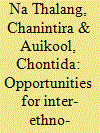

|
|
|
|
|
| Summary/Abstract |
As the conflict in Thailand’s southern border provinces shows no signs of abating, this article examines why Malay Muslims have managed to co-exist alongside the Thai Buddhists and the Sino-Thai population. Based on fieldwork, this article argues that while various factors have hardened ethno-religious identities and strengthened boundaries between ‘the other’ which in turn have affected inter-ethnic relations, a variety of opportunities for civic engagement has served to counter the prospect of ethnic relations erupting into communal violence.
|
|
|
|
|
|
|
|
|
|
|
|
|
|
|
|
| 13 |
ID:
087278
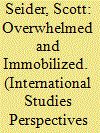

|
|
|
|
|
| Publication |
2009.
|
| Summary/Abstract |
In this study, I compared the shifts in worldview of affluent young adults participating in a course on social justice issues to a control group of similar young adults. In this course, participating students learned about the size, scope, causes, and impact of world hunger and global poverty. However, an analysis of pre- and postsurvey data revealed that the young adults participating in the social justice course experienced a decline over the course of the semester in their support for humanitarian aid in comparison to the control group. Interviews with these young adults, and analyses of their student work, revealed that the manner in which they learned about world hunger and poverty led them to become overwhelmed by the size and scope of these global problems and convinced of their intractability.
|
|
|
|
|
|
|
|
|
|
|
|
|
|
|
|
| 14 |
ID:
099286
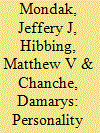

|
|
|
| 15 |
ID:
090677
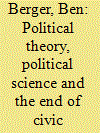

|
|
|
|
|
| Publication |
2009.
|
| Summary/Abstract |
Within a span of fifteen years civic engagement has become a cottage industry in political science and political theory, but the term has now outlived its usefulness and exemplifies Giovanni Sartori's worry about conceptual "stretching." This article traces civic engagement's ascension as a catch-all term for almost anything that citizens might happen to do together or alone, and illustrates the confusion that its popularity has occasioned. It proposes that civic engagement meet a well-deserved end, to be replaced with a more nuanced and descriptive set of engagements: political, social, and moral. It also examines the appeal of engagement itself, a term that entails both attention and energy. Attention and energy are the mainsprings of politics and most other challenging human endeavors. But they can be invested politically, or in associative pursuits, or in moral reasoning and follow-through, and those types of engagement can, but need not, coincide. We should be asking which kinds of engagement-which kinds of attention and energetic activity-make democracy work, and how they might be measured and promoted.
|
|
|
|
|
|
|
|
|
|
|
|
|
|
|
|
| 16 |
ID:
166496
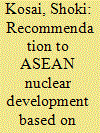

|
|
|
|
|
| Summary/Abstract |
The disastrous circumstances in the aftermath of a massive event like Fukushima nuclear accident is not unique to Japan. The more exertion to prevent the next Fukushima nuclear accident is required not to reiterate the similar failure. The countries where nuclear power is potentially introduced in future need to study the lessons learnt from the Fukushima nuclear accident, which would help to highlight the critical point for the future nuclear operation. However, the scholarly application of the lessons from the Fukushima nuclear accident to such countries, in particular ASEAN Member States (AMS), has yet to be fully discussed. As such, this study first conducts the diachronic analysis of various energy and nuclear policies in Japan before and after the Fukushima nuclear accident and then identifies the three major lessons and challenges, that is; nuclear regulatory institutional reform, development of stringent regulation and public engagement in policy making. Finally, the current nuclear situation in Indonesia, Malaysia, the Philippine and Thailand in ASEAN is analyzed to extract the critical aspect of nuclear installation in AMS and to provide strategic implications on the basis of the identified lessons learnt from the Fukushima nuclear accident.
|
|
|
|
|
|
|
|
|
|
|
|
|
|
|
|
| 17 |
ID:
131803
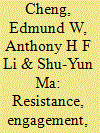

|
|
|
|
|
| Publication |
2014.
|
| Summary/Abstract |
An enduring question with regard to the voluntary sector is how it can nurture civic engagement and provide public goods. A World Heritage listing for Penang highlights this question by revealing a vibrant civil society network that has made heritage conservation an issue for public discourse and policy agenda. This paper discusses how the marginalized trajectory of Penang is related to the development of its civic realm, social cohesion and local identity, which are sources of Penang's voluntarism. It then examines the engagement pattern of the Penang Heritage Trust, a leading association, which has mounted resistance against the state's failure in heritage provision. This bottom-up approach has preserved Penang's cultural heritage and associated identity, and reveals the distinct nature and capacity of Penang's voluntary sector that goes against the general pattern in Malaysia.
|
|
|
|
|
|
|
|
|
|
|
|
|
|
|
|
| 18 |
ID:
116476
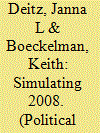

|
|
|
|
|
| Publication |
2012.
|
| Summary/Abstract |
Young adults have particularly low levels of civic engagement. Incorporating experiential learning activities as part of the political science curriculum shows promise to reverse this trend. We analyze the impact of a mock presidential election simulation on the civic engagement of college-aged students. Exit surveys of student participants and a one-year follow-up survey confirm that this experiential learning activity had a positive effect on participants' levels of political knowledge, their interest in public life, and their attitudes about government in general.
|
|
|
|
|
|
|
|
|
|
|
|
|
|
|
|
| 19 |
ID:
150175
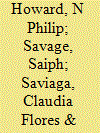

|
|
|
| 20 |
ID:
096390
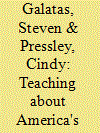

|
|
|
|
|
| Publication |
2010.
|
| Summary/Abstract |
Civic engagement is increasingly recognized as a significant function of public universities. The university provides a variety of opportunities for civic engagement, including co-curricular activities, service learning opportunities, and specific majors and minors. This article reviews the attempt to embed civic engagement and civic education about the national debt and budget deficit issues in a university core curriculum course at Stephen F. Austin State University. We focus on specific issues of curriculum instruction and assessment of student learning of knowledge regarding the debt and deficit issues.
|
|
|
|
|
|
|
|
|
|
|
|
|
|
|
|
|
|
|
|
|